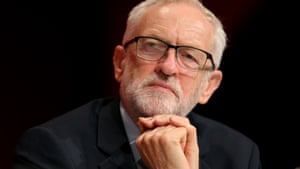The Electronic Intifada
“Ally” Jon Lansman wanted Jeremy Corbyn removed

Jon Lansman addressing the Jewish Labour Movement at Labour conference 2018.
ZUMA Press
Jon Lansman, a prominent figure in the UK Labour Party [ and a zionist Jew himself (RB) ], advocated that Jeremy Corbyn be removed as party leader three years ago.
The revelation challenges Lansman’s reputation as a key Corbyn supporter.
In 2016, Lansman told Labour activist Graham Bash that the left would be much better served if Corbyn was replaced by John McDonnell, the shadow finance minister.
Bash recounted his conversation with Lansman to The Electronic Intifada.
Two other veteran Labour left-wingers, who once had good relations with Lansman, told The Electronic Intifada similar stories, on condition of anonymity.
One said that in 2015, Lansman had expressed to them a wish that McDonnell had contested that year’s leadership election and won instead of Corbyn.
But Bash was clear that when speaking to him, Lansman had been “much more active than that,” and was pushing for Corbyn’s exit.
Asked via email to comment on why he had privately advocated for Corbyn to be replaced with McDonnell, Jon Lansman replied: “This is not true. I back Jeremy 100 percent.”
He did not address the specifics of Bash’s account that were put to him. He did not reply when asked in a follow-up if he was denying that the phone call with Bash ever took place.
Asked about the 2016 conversation, a Labour spokesperson said Jeremy Corbyn had had no knowledge of it before now.
A spokesperson for McDonnell declined to comment.
“Extremely dangerous”
Active in the campaign to elect Corbyn as head of the UK’s main opposition party, Lansman later became chair of Momentum, the left-wing group established amid the wave of popular support for Corbyn.
Lansman now sits on Labour’s ruling national executive.
Bash is an executive member of the Labour Representation Committee, a left-wing group that boasts shadow finance minister John McDonnell as president.
“I felt this talk was extremely dangerous,” said Bash of his 2016 discussion with Lansman.
Bash asked Lansman if he’d spoken to John McDonnell about taking over as leader.
Bash recounted Lansman’s reply: “John [McDonnell] told me to fuck off.” Bash said he’d politely told Lansman to follow McDonnell’s advice.
Bash said that he was only speaking out now because Lansman “has supported the witch-hunt of many on the left.”
Lansman is hostile toward Jewish Voice for Labour, a left-wing group which defends Palestinian rights.
In an email exchange with the group, Lansman wrote that “neither the vast majority of individual members of JVL nor the organization itself can be said to be part of the Jewish community.”
He also suggested that Jewish Voice for Labour was “part of the problem,” implying that the group was anti-Semitic.
Lansman and Zionism
Lansman has an ambivalent attitude towards Israel and Zionism, the state’s ideology.
While he has made some comments critical of Israel, he has spoken with disdain about anti-Zionist Jews, failed to defend Corbyn from “Labour anti-Semitism crisis” smears and repeatedly called for prominent Labour figures falsely accused of anti-Semitism to step down, or be expelled.
Lansman has suggested that it is anti-Semitic for the left to even use the term “Zionism” – unless praising the ideology.
A source in Westminster told The Electronic Intifada that Corbyn is privately so angry with Lansman that he is no longer welcome in the party leader’s office.
A Labour spokesperson denied this, saying Lansman had visited the office “regularly,” and as recently as the summer.
Lansman also denied it saying, “I’ve been to the leader’s office more than once this week.”
Divisions on the left
Corporate media outlets hostile to Corbyn have for years attempted to stoke talk of divisions between the Labour leader and John McDonnell – probably Corbyn’s closest political ally.
Because of that, Bash says, he had not revealed Lansman’s words to “anyone other than the closest comrades” until now.
In conversations with The Electronic Intifada, Bash recalled that his phone conversation with Lansman took place in 2016.
It occurred months after Corbyn was elected leader in 2015, but “well before” the coup attempt against his leadership in June 2016, Bash said.
On 24 June that year, right-wing Labour MPs led by Labour Friends of Israel supporter Margaret Hodge launched an attempt to replace Corbyn as leader.
The attempted ouster led to a leadership challenge by right-wing Labour MP Owen Smith. The challenge failed. Corbyn won the leadership election with an increased majority of member votes that September.
Hodge’s plan had been in the works since at least May of that year. Lansman appears to have been thinking along similar lines around the same time.
Outrage among right-wing Labour MPs against Corbyn that summer often focused on Brexit.
Hodge was more interested in helping manufacture an anti-Semitism “crisis” against Corbyn, some press reports indicate.
Bash recalls that Lansman didn’t raise any specific problem he had with Corbyn. But, according to Bash, Lansman said the Labour leader “wasn’t being specific enough, clear enough, sharp enough” and he “didn’t think that he was very effective.”
Corbyn for leader
Accounts of how Corbyn was first successfully elected leader in September 2015 often mention how McDonnell and Lansman took turns standing outside Labour’s offices in Parliament to pressure MPs to nominate Corbyn.
Hardly any Labour MPs supported Corbyn’s socialist, internationalist politics. But grassroots pressure persuaded just enough of them to “lend” Corbyn their votes, on the basis that it would be a more balanced leadership election, giving the membership the widest possible options.
Corbyn has long opposed injustice in Palestine. He has worked closely with such groups as the Palestine Solidarity Campaign and the Palestinian Return Centre, which calls for Palestinian refugees to be allowed to return to lands from which they were expelled in 1948.
At the start of the summer of 2015, few people – including even some of his supporters – expected Corbyn to win. He was initially running to make a political point and push Labour’s left into the debate over party policy.
One source previously close to Lansman told The Electronic Intifada that Lansman wanted to use the election campaign as a “stepping stone” to reinvigorate the Labour left, even if Corbyn lost.
By the spring of 2016, his supposed ally was having doubts about Corbyn as leader.
It became clear during the coup attempt led by Margaret Hodge that summer that the Labour membership, which overwhelmingly backed Corbyn, would not stand for it.
Despite Lansman’s private misgivings, Momentum strongly supported Corbyn during the failed coup.
Asa Winstanley is an investigative journalist with The Electronic Intifada.
 South Building at The University of North Carolina in Chapel Hill, North Carolina. Photograph: Gerry Broome/AP
South Building at The University of North Carolina in Chapel Hill, North Carolina. Photograph: Gerry Broome/AP


